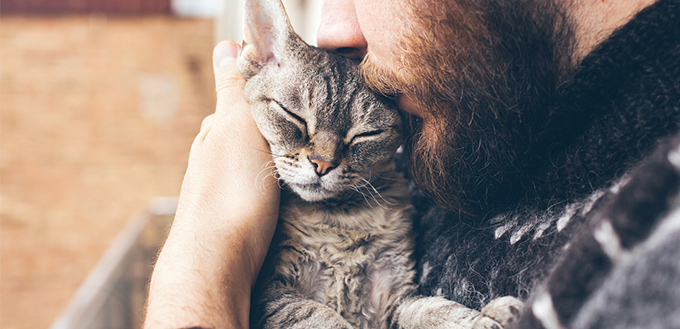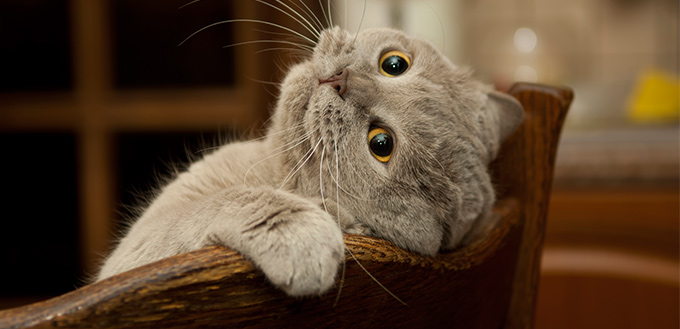You might have noticed your cat bumping his head, legs, face, hand, or whatever other part of you he can reach. People usually refer to this as head butting, but that term isn’t actually correct. The actual term is ‘head bunting’, but why do cats do it? They have a few reasons.
You’re Part of the Family
You might notice that your cat particularly likes to head bunt after you’ve come home after being out of the house for a while.
A cat’s world is full of smells, and while their eyesight is really good as well, they tend to rely on their sense of smell. This is why they’ll scent mark their territory. Head bunting is similar, but it’s also a little different. Head bunting is to create a communal scent, so that every member of the colony shares the same smell. This means that a cat can instantly tell who belongs who his family, and who doesn’t.
When you come home from work, your cat will often head bunt as part of his social bonding rituals. He’s partly telling you that he loves you, but he’s also telling you that the communal scent has been wearing off, and he needs to intensify it. He’ll release pheromones from the scent gland on his head. These glands are above the eye, and below the ear. You might notice this spot looking thinner than the rest of his coat as he ages.

I Love You
As well as creating a communal scent within his colony, or family. Your cat is head bunting to give you a direct message.
You might notice that he comes striding towards you, or he might lie down a few times as he makes his way over to you. You should notice that his behavior is relaxed, and he may be purring. His eyes, whiskers and ear will all be relaxed, and not pricked forward like they would be if he was hunting. He may alternate between head bunting you, and cheek rubbing against the furniture.
While cheeking rubbing is often more about scent marking, and claiming ownership, it gives a different message when combined with head bunting. Your cat is telling you, and others, that there is a relationship between you, and that he has great affection for you.
Social Status
If you have more than one cat, there will be a social status to determine which cat is responsible for making sure that each colony member shares the communal scent. This doesn’t mean that your other cats won’t head bunt with you, but you might notice one cat head bunting more than the others. Or you might notice that there’s one cat who initiates head bunting behavior more than the others.
Bunting is a more important method of sending a message than other behaviors like urine marking. This is one reason why it’s a more common behavior for the dominant cat. A submissive cat may head bunt with you when he’s alone, but you’re unlikely to see him initiating head bunting with your other cats.
What to Do When Your Cat Head Bunts You
As head bunting is first and foremost a social behavior, it’s a great opportunity for you to develop, deepen, and enrich your relationship with your cat. You should look at head bunting as a compliment. Cats will only head bunt with animals and people who they consider to be family, so you are one of a privileged few. You may even be the only person who your cat will head bunt with.
How you reciprocate will depend on your cat, and how well you know him. Some cats aren’t comfortable and don’t want any kind of a response from you. There needs to be a bond, and trust before you reciprocate. If you aren’t sure then you need to work slowly, and allow time for the relationship between you to get to that stage. When he head bunts you, you can offer him your hand. If he’s comfortable with that, then you can work up to other ways to reciprocate.
Some owners will head bunt back, or simply offer their forehead. Others will scratch under the chin. It really depends on what your cat likes, and how close your relationship is. If your bond hasn’t gotten to the stage of head bunting, then there are still other ways for you to strengthen your bond. You can groom him, encourage play, and give him treats.

Related Post: Best Cat Treats
Other Behaviors
There are two behaviors that cats will engage in that may look a little like head bunting. They are different, and it’s important that you get to know your cat. You need to be aware of what is and isn’t normal for him.
Territory Marking
Territory marking can look like head bunting, especially if your cat uses the cheek scent glands, but it is different. It’s a relatively normal behavior, but it can be cause for concern if your cat is overly marking. It can be a sign that he is feeling insecure, or that there’s something amiss in his world.
Head Pressing
Head pressing is when your cat presses his head against walls or furniture. He may be vocal, and he will probably be wincing. Head pressing means that he has pain in his head, and he’s looking for relief. If you notice your cat doing this, then you should call his veterinarian for advice.
Cats will only head bunt when they’re happy. They need to be relaxed, and have affection and trust for the person, or animal that they’re engaging with. So when your cat head bunts with you, what he’s really saying is that he loves you.
Sources:
- Katherine Tolford, Cat Head Butting: What Does it Mean?, PetMD







